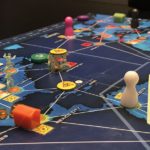Board game publishers deal with a lot of things you never see. Publishing companies like my own, Pangea Games, can take actions that seem really weird to an outsider.
In this series, I share tales from my own experiences, observations gleaned from playing other board games, and insights gained from the Pangea Games online communities. All of this will come together, week by week, to help you understand the big, complicated world of board game publishing.
Looking for more resources to help you on your board game design journey?
Here you go: no email required!
Like this writing style?
Check out my latest blog on marketing here.
Why Board Game Publishers are So Weird |
|
 |
6 Reasons You Shouldn’t Make Board Games AloneThe board game industry has changed an enormous amount in the last few years. We’re seeing more million dollar Kickstarter campaigns. We’re seeing “good ideas” go to Kickstarter and struggle to fund, if they fund at all. More and more, game developers are starting to co-publish, working in larger teams and getting more than one brand name on a box. What’s all that about and what does this have to do with working alone versus working in a team? |
 |
What is a Tabletop Game? This is Everything that Goes into Making a Board Game.For the last few years, we’ve been living through a glorious age: the Great Board Game Renaissance. In a world aglow with smartphones, tablets, and those annoying billboards that change every five seconds on the side of the road, analog gaming has become a welcome retreat for millions. I wouldn’t have expected history to unfold like that when I was a kid, but here we are. |
 |
People are Weird, Markets are Weirder…Especially with Board GamesFor the last several years, wildly successfully Kickstarter campaigns have redefined the rules of success in the board game industry. You no longer had to submit your game to publishers or raise a bunch of money to bankroll your own print run. People like Jamey Stegmaier, creator of Scythe and the Kickstarter Lessons blog, were able to create multi-million dollar businesses with relatively little. |
 |
Why Board Game Publishers Like Some Games and Don’t Like OthersIt’s no secret that board game publishers like to reduce risks. Most publishers have a system in place to help them filter marketable game ideas from unmarketable game ideas. That way, they don’t wind up sorry. Explained this way, it sounds innocuous. It looks like a true meritocracy where the best ideas are the ones taken to the market. Yet the process, so heavy on rejection, has left many game designers heartbroken. |
 |
How to Understand the Tabletop Gaming News CycleThere are weirdo group dynamics that are exacerbated by the technological advances of our era, namely search engines, social media, and an unending deluge of data. Nowhere are these weird group dynamics more obvious than in the tabletop gaming news cycle. |
 |
Board Game Designer vs. Developer vs. PublisherCreating board games takes an enormous amount of time and effort. The simple fact is that there are a lot of distinct tasks that have to be handled to turn a game from an idea into reality. This is why I urge new creators to share the workload, delegating tasks to a team instead of doing them all alone. When it comes to delegation, it helps to define some roles. Let’s start with three roles: designer, developer, and publisher. |
Learning from Great Board Games |
|
 |
The 10 Most Popular Board Games of All Time and Why They Made Board Gaming BetterI can remember a time of board games before the modern board gaming boom. Perhaps it’s Christmas Eve today that’s kindling my nostalgic impulses. I’d like to take a moment today and look back at the top-selling board games of all time. Some have aged beautifully, some have aged horribly, but in all cases we can talk about them and learn from them. |
 |
The 10 Best Board Games of All Time and What We Can Learn from ThemThere are over 100,000 board games in existence. The vast majority have been forgotten and buried in the sands of time. A handful have stood out head and shoulders among the rest, working their way up to the top 10 games on Board Game Geek. This is a truly staggering achievement because pleasing Board Game Geek users is no easy task! |
 |
5 Lessons from Catan for Aspiring Board Game DesignersThe board game market as we know it today did not exist yet. Catan was the first major hobby board game to come into existence. Even 24 years later, we can still look back at this game and learn lessons from it. |
 |
4 Lessons from Santorini for Aspiring Board Game DesignersSantorini is a fantastic board game that came out about two years ago. In its heart, it’s an abstract strategy game that could have come from antiquity. It has been given the modern board game polish, though, with adorably cutesy art of Greek gods, and an incredibly photogenic set of stackable plastic components. |
 |
4 Lessons from Pandemic for Aspiring Board Game DesignersLet’s talk about Pandemic – one of the greatest games ever made. Despite being more than ten years old now, this new classic can still teach us a lot. |
 |
4 Lessons from Sagrada for Aspiring Board Game DesignersSagrada is one of my recent favorite board games. It is fundamentally a pretty simple game, but it has a lot of really endearing qualities. |
 |
4 Lessons from Terraforming Mars for Aspiring Board Game DesignersI played Terraforming Mars for the first time recently. It is an absolutely fantastic game and really valuable for learning board game design. |
 |
4 Lessons from Ticket to Ride for Aspiring Board Game DesignersTicket to Ride came out in 2004. Along with games like Catan and Pandemic, Ticket to Ride helped turn board gaming into the hobby that we love today. |
 |
4 Lessons from Azul for Aspiring Board Game DesignersAzul has taken the board game world by storm. Like Sagrada, it’s a gorgeous and approachable puzzle game with emergent complexity. |
Uncommon Points of View |
|
 |
Board Game Fulfillment & Why it Matters on Day 1 of Game DevelopmentBoard game fulfillment is really complex. It often determines how big games are and how many components can be included. Worth considering even on Day 1! |
 |
Could Kickstarter Become a Board Game Store by 2020?Kickstarter has started taking pre-orders. The games already exist and people are effectively buying them from Kickstarter. It’s a store by any other name. |
 |
Don’t Just Build a Board Game, Build a BusinessMany people make board games when they want to make money instead. Yet they forget to build a business along the way. So let’s talk about that. |
 |
How to Build Your First Online Community to 1,000 Members (or More)Building an online community can be daunting. You can feel like your voice isn’t heard and that community building is futile. Fortunately, this isn’t so! |
 |
Board Gaming in 2029: Kickstarter & Cardboard 10 Years from NowThe year is 2029. Everybody has jetpacks. What does board gaming look like in this brave new world 10 years into the future? What happened to Kickstarter? |
 |
12 Questions About Board Game Order Fulfillment & Shipping, AnsweredOf all the ways to learn about board game fulfillment, I didn’t think immediately of the Quacks of Quedlinburg. Turns out, you asked some great questions! |
 |
6 Right and Wrong Reasons to Make a Board GameMaking board games is hard. Many people who make board games can’t tell the difference between the right and wrong reasons to get into the industry. |
 |
5 Reasons Why Board Games are So Popular in 2019The obstacles to the modern board gaming landscape gave way. We have Scythe, Terraforming Mars, Gloomhaven. Let’s talk about why board games are so popular. |
 |
4 Ways to Vet Your Board Game Before Launching a KickstarterMany board game designers are competent, except for testing their basic ideas. So how can you do that before the rigamarole of launching a Kickstarter? |
 |
Board Games Aren’t Everything: 8 Reasons to Diversify Your BusinessBoard games aren’t everything. The world is very large and the opportunities to serve others are diverse and abundant. Don’t pigeonhole yourself! |
 |
Do It Anyway: Make the Board Game You WantYou have to make the board game other people want. Or do you? I didn’t get into business by being a human calculator. I was 22, chasing a childhood dream. |
